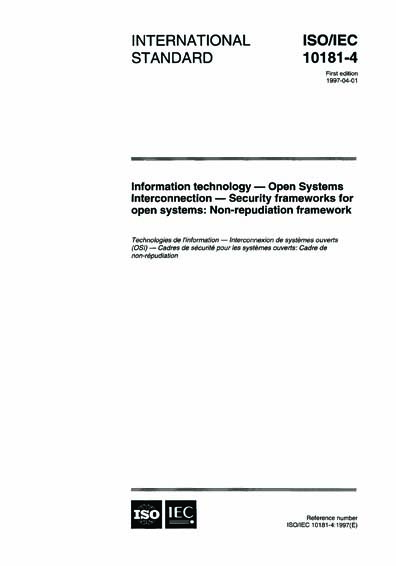Most recent
ISO/IEC 10181-4:1997
Information technology - Open Systems Interconnection - Security frameworks for open systems: Non-repudiation framework - Part 4:
This Recommendation | International Standard addresses the application of security services in an Open Systems environment, where the term “Open Systems” is taken to include areas such as Database, Distributed Applications, Open Distributed Processing and OSI. The Security Frameworks are concerned with defining the means of providing protection for systems and objects within systems, and with the interactions between systems. The Security Frameworks are not concerned with the methodology for constructing systems or mechanisms.
The Security Frameworks address both data elements and sequences of operations (but not protocol elements) which are used to obtain specific security services. These security services may apply to the communicating entities of systems as well as to data exchanged between systems, and to data managed by systems.
This Recommendation | International Standard:
- defines the basic concepts of Non-repudiation;
- defines general Non-repudiation services;
- identifies possible mechanisms to provide the Non-repudiation services;
- identifies general management requirements for Non-repudiation services and mechanisms.
As with other security services, Non-repudiation can only be provided within the context of a defined security policy for a particular application. The definitions of security policies are outside the scope of this Recommendation | International Standard.
The scope of this Recommendation | International Standard does not include specification of details of the protocol exchanges which need to be performed in order to achieve Non-repudiation.
This Recommendation | International Standard does not describe in detail the particular mechanisms that can be used to support the Non-repudiation services nor does it give details of the supporting security management services and protocols.
Some of the procedures described in this framework achieve security by the application of cryptographic techniques. This framework is not dependent on the use of a particular cryptographic or other algorithm or on particular cryptographic techniques (i.e. symmetric or asymmetric) although certain classes of Non-repudiation mechanisms may depend on particular algorithm properties. Indeed it is likely, in practice, that a number of different algorithms will be used. Two entities wishing to use cryptographically-protected data must support the same cryptographic algorithm.
A number of different types of standard can use this framework including:
- standards that incorporate the concept of Non-repudiation;
- standards that specify abstract services that include Non-repudiation;
- standards that specify uses of a Non-repudiation service;
- standards that specify the means of providing Non-repudiation within an open system architecture; and
- standards that specify Non-repudiation mechanisms.
Such standards can use this framework as follows:
- standards of type 1), 2), 3), 4) or 5) can use the terminology of this framework;
- standards of type 2), 3), 4) or 5) can use the facilities defined in clause 7; and
- standards of type 5) can be based upon the classes of mechanism defined in clause 8.
Content Provider
International Organization for Standardization [iso]






